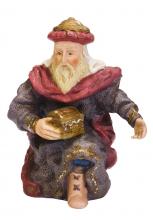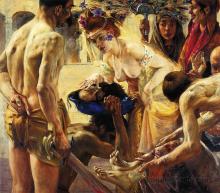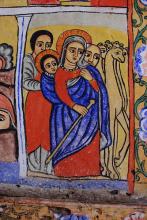herod

GOD IS NOT a neutral observer of our worldly affairs. “God takes sides,” the Brazilian theologians Clodovis and Leonardo Boff explain in Introducing Liberation Theology. God is not a dispassionate consultant, nonpartisan mediator of divisions, or a disinterested negotiator of political antagonisms. “God takes sides and comes on the scene as one who favors the poor,” Mexican theologian Elsa Tamez writes in Bible of the Oppressed. “The God of the biblical tradition is not uninvolved or neutral,” U.S. theologian James H. Cone argues in A Black Theology of Liberation. “God is active in human history, taking sides with the oppressed.”
God has already decided to live in solidarity with people who have survived injustice after injustice. The incarnation reveals the partisanship of God—that, in Jesus, God becomes one of the “disinherited,” to use Howard Thurman’s language. The life of Jesus is the story of how God takes the side of “people who stand with their backs against the wall,” as Thurman puts it in Jesus and the Disinherited, populations “disinherited from participation in meaningful social process,” groups segregated from “any stake in the social order.”
The Bible passages this month call us to examine where we stand. They illumine the borders of power—the divide between privilege and oppression that slices through our communities—and prod us with a question: Which side are you on?

As Pope Francis officially opened this year’s Christmas Nativity scene in St. Peter’s Square, he said Jesus was a “migrant” who reminds us of the plight of today’s refugees.
Francis told donors who contributed both the Nativity set and an 82-foot tree that the story of Jesus’ birth echoes the “tragic reality of migrants, on boats, making their way toward Italy,” from the Middle East and Africa today.

Wizards! Caspar! Melchior! Balthasar!
Why fly straight to Fox Herod? Through
Unbounded night—! Bringing only news
Ripe for bloodletting. How black a star
You follow. Herod knows. How bizarre
A kingly claim. Will he oppose? Muse
Like Mary? Ha—! Mothers’ sons lose
Heads to swords & axes. Herod bars
The throne to Jesus. Who kills first?

Every year, a chorus of Christians join together to bemoan the “War on Christmas,” lambasting their enemies for taking Christ out of Christmas, and yearning for the days when everyone remembered the reason for the season.
But have we all forgotten? There has always been a war on Christmas. In fact, conflict lies at the very heart of Christmas. To those who say that Christmas is all about peace on earth, a quick look at the second chapter of Matthew and the largely overlooked story of King Herod reminds us that this peace comes at a price. For it is the kind of peace that can only come through conflict. Before caroling, there was weeping in Ramah.
It’s no surprise that most Christmas pageants leave out the Herod story. King Herod jealously guarded his power, killing anyone who got in his way. When he learns of Jesus’ birth, he declares the first war on Christmas. Herod doesn’t just want to kill Jesus. He wants to destroy him, taking Christ out of Christmas once and for all. When his efforts are thwarted, he resorts to genocide to ensure Jesus’ demise, murdering every male infant in Bethlehem. This, for Herod, is a bargain to rival any department store sale: The lives of Bethlehem’s youngest? A mere pittance for unrivaled power.
In other words, Herod gets it. Herod, more than anyone else in the story so far, sees this poor, refugee child for who he really is — a rival king.

As we move into the Sundays following Christmas and begin to anticipate Epiphany, we face the terror of the coming week’s Gospel reading, the Massacre (or Slaughter) of the Innocents. While there are a number of stories in the Bible that are difficult to read/hear, Herod’s murdering the innocent children of Bethlehem in his attempt to kill a potential threat to his throne must be among the top.
Herod’s brutality is legendary. Most of what we know comes from the Jewish historian, Josephus. Matthew records that Herod became distraught when he learned from the Magi that an astrological sign had indicated the birth of a Judean King (2:1-8). When the Magi did not return to report the location of this newborn King, Herod realized that he been tricked and “he was infuriated, and he sent and killed the children in and around Bethlehem who were two years old or under” (2:16). While scholars debate whether this event is historical or not, it is certainly consistent with what we learn about Herod from Josephus.

When Harper was born we decorated the nursery in a Noah’s Ark theme…images of Noah and of animals entering a large wooden boat two-by-two. It’s a common enough decorating scheme for kids' rooms.
I mention it because this week at Bible study we discussed how weird it is that the beheading of John the Baptists isn’t a common decorating scheme for kid’s rooms.
Because this is just too gruesome a tale to show up on rolls of juvenile wall paper.
In case you missed the details, here’s what happened:
So Herod is the ruler of the region, and while vacationing in Rome he gets the hots for his brother’s wife who he then marries. John the Baptist, then suggests that maybe that’s not ok.
Now, Herod likes John, as much as anybody can like a crazy bug-eating prophet who lives outdoors and speaks consistently inconvenient truths. Truths such as it’s not ok to marry your brother’s wife, which, incidentally, is the truth that when spoken, got him arrested to begin with.
It also got John on the bad side of Herod’s new illegal wife Heroditas. She did not like John. Then when Herod throws himself a big birthday party his daughter-in-law Salome dances for him and all the other half-drunk generals and CEOs and celebrities who were there.
We don’t know the exact nature of her dance but we do know that it “pleased” Herod enough that he offered to give her anything she wanted up to half of his kingdom. So, you know, I don’t think it was the Chicken dance.

In the Incarnation, Christ brings hope to a world where, for the time being, Herod is still king, and all is not as it should be. Christmas includes the story of a terrible genocide — a traumatic refugee experience for young Jesus and his parents, and all the worse for those parents who were not warned in a dream and thus did not escape to Egypt before their infant sons were murdered — but as evangelicals we seldom reflect on this part of the story. (Catholic & Anglican Christians remember these victims on the Feast of the Holy Innocents on December 28, a practice I adopted for the first time last year.)
The great hope of Christmas, though, is that it represents the entry into history of a Prince of Peace, who will eventually dethrone Herod and Caesar and set all things right. We’re still living in that tension: Christ’s kingdom has been inaugurated but is not here in fullness yet, as the injustice of last December’s DREAM Act vote and a thousand other tragedies of poverty, conflict, and marginalization throughout our globe remind us. So Christmas is a time for mourning and for hopeful joy: and it is entirely right that Advent is a time of eager and expectant yearning. O Come, O Come, Emmanuel!